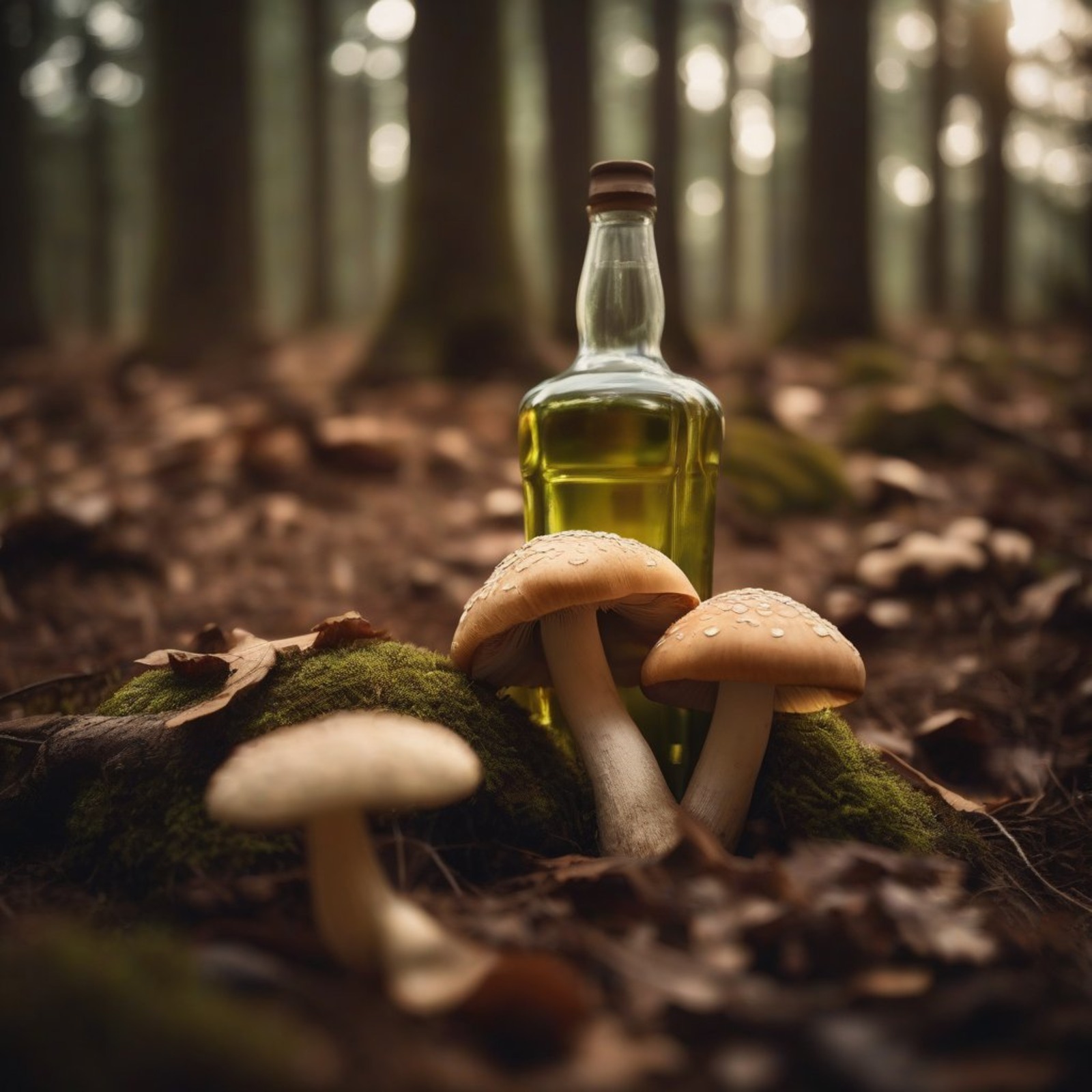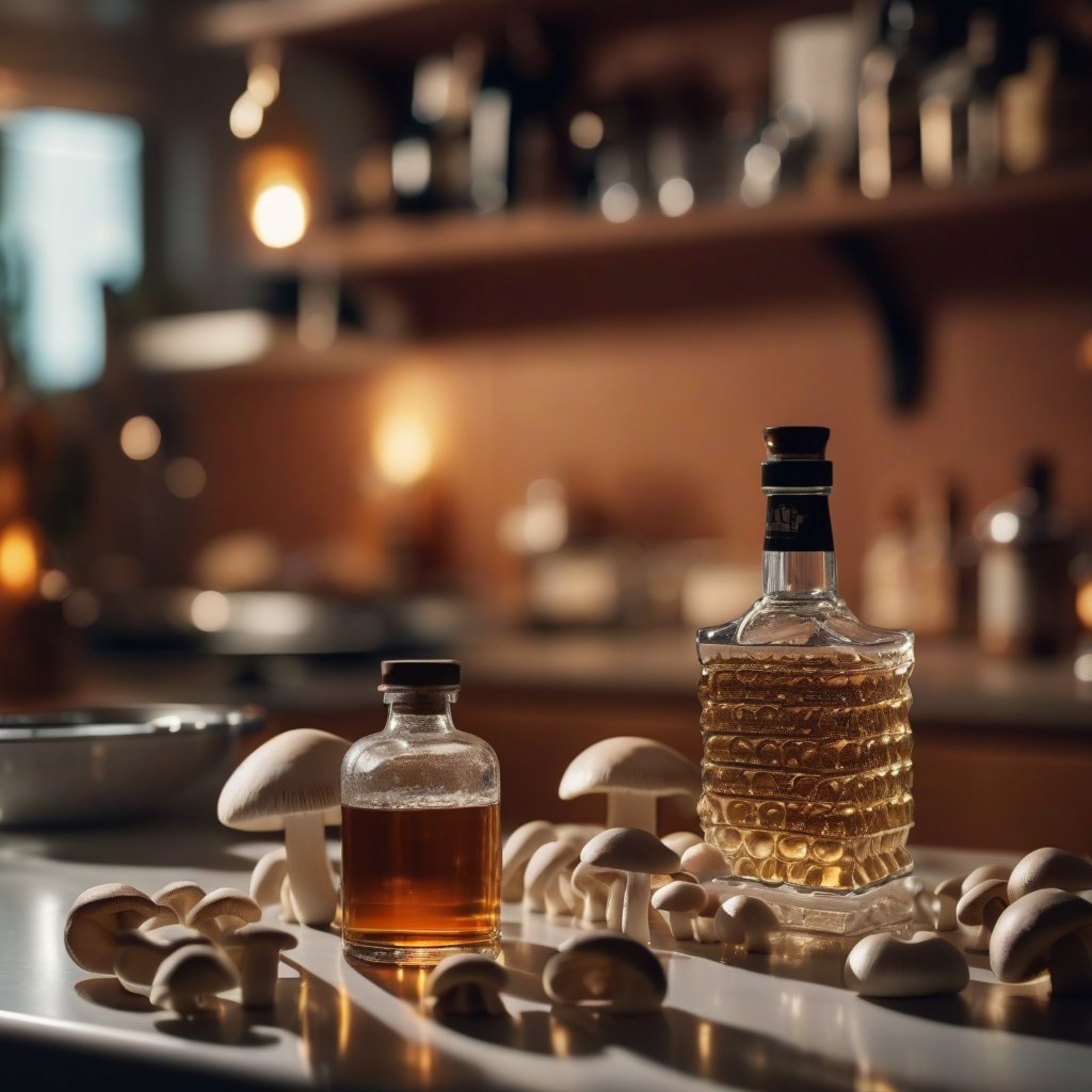Substances | 6 min read
Can You Mix Alcohol and Mushrooms? The Dangers, Risks, and Effects
Medically Reviewed By

On January 8, 2024
Written By
On January 8, 2024

What you will learn
- When you take two substances that each have physiological and psychological impact, they interact in ways that can be difficult to predict and dangerous.
- The effects of alcohol include reducing inhibitions, impairing motor function, and increasing relaxation.
- The effects of psilocybin mushrooms are deeply subjective, varying widely based on factors such as dosage and individual sensitivities.
- When taken together, alcohol and magic mushrooms can amplify the potential for harm to both physical and mental well-being.
Alcohol is among the most used substances in the world, playing a large role in the cultures and social practices of many different countries.[1] Psilocybin mushrooms (also known as magic mushrooms) have grown in popularity over the past few decades as well and are also being studied for their potential therapeutic benefits in the clinical setting.[2]
However, using either of these substances can also lead to issues with overconsumption and addiction—and combining alcohol and mushrooms can lead to unpredictable results and negative health outcomes.
Why is Mixing Substances Dangerous?
Combining substances can be risky due to the unpredictable interactions they can bring about. When two substances with varying physiological and psychological impacts interact, they can amplify, diminish, or alter each other’s effects in ways that can be difficult to predict.[3] This interplay can bring about unexpected and adverse reactions and intensified side effects, posing potential threats to both your physical and mental well-being.
The Effects of Alcohol
Alcohol is a central nervous system (CNS) depressant and is known to induce relaxation, impair motor coordination, and temporarily alter your judgment or lower your inhibitions.[4] Smaller amounts can lead to increased sociability and feelings of euphoria, but its depressant properties become more pronounced with increased consumption, potentially leading to slurred speech, impaired coordination, and nausea or vomiting.
The Effects of Mushrooms
Psilocybin mushrooms influence serotonin processing in the brain, resulting in shifts in mood, perception, and cognition.[5] The effects of psilocybin mushrooms are deeply subjective, varying widely based on factors such as dosage and individual sensitivity.
Some people report a deep sense of introspection, whereas others can experience auditory or visual hallucinations. It’s possible to experience heightened anxiety or confusion, particularly if you find yourself in an unfamiliar or anxiety-provoking environment.
The Effects of Combining Alcohol and Mushrooms
Alcohol and mushrooms each carry their own set of risks, and combining them amplifies their potential for harm to both physical and mental well-being.[6] When consumed in excess, alcohol can impair cognitive function, potentially leading to accidents and risky behaviors. When alcohol is combined with mushrooms—which themselves induce altered perceptions and emotions—the results can often be unpredictable.
Alcohol has the potential to intensify the effects of mushrooms, potentially leading to overwhelming hallucinations, confusion, and paranoia. Such a heightened state of altered consciousness can be disorienting and distressing, potentially leading to panic attacks or feelings of extreme unease.
Moreover, the combination of alcohol and mushrooms can make it difficult to gauge one’s own state of mind, leading to further poor decision-making and increased risk of harm. For example, impaired judgment from alcohol could lead you to engage in unsafe activities while under the influence of mushrooms, putting your physical well-being at risk far more than you would be comfortable with otherwise.
Another concern is the potential impact on mental health, as both alcohol and psychedelics can have profound effects on mood and emotions. Combining substances could potentially lead to intensified emotional states, including feelings of anxiety or depression.[7] The comedown from alcohol, which can include feelings of sadness and anxiety, could amplify any negative emotions brought on by the psychedelic experience.
Can You Overdose by Combining Alcohol and Mushrooms?
Combining alcohol and mushrooms can result in several adverse health effects. While traditional overdose from these substances (mushrooms in particular) might differ from that of more potent drugs, their potential for harmful outcomes remains significant.
Both alcohol and mushrooms can have complex and unpredictable effects on the CNS, and combining them can intensify their impact. Alcohol, a depressant, can slow down brain activity, impair judgment, and reduce coordination. Psilocybin mushrooms, on the other hand, can lead to altered perceptions, hallucinations, and emotional shifts. The interaction between these substances can exacerbate the adverse effects of both, potentially leading to a range of different health issues.
Physically, an individual might experience extreme confusion, nausea, vomiting, and a heightened risk of accidents due to impaired motor skills when combining the two substances. Psychologically, the effects of mushrooms could become overwhelming, leading to severe anxiety or paranoia. The risk of harming oneself or others due to altered perception and judgment significantly increases.
Moreover, the combined strain on the cardiovascular system could lead to increased heart rate, high blood pressure, and an elevated risk of heart-related issues. The potential for dehydration is also increased, as both substances can contribute to fluid loss.
It’s important to note that the dosage and potency of both alcohol and mushrooms can vary widely. What might be a manageable quantity of each substance on its own could become dangerously potent when combined.
In extreme cases, the physical and psychological effects of this combination could spiral into a medical emergency requiring immediate attention. Given the potential for serious harm, including overdose, physical injury, and negative psychological outcomes, you should avoid combining alcohol and mushrooms, as their potency can lead to unintended consequences.
The Long-Term Effects of Combining Alcohol and Mushrooms
The long-term effects of combining alcohol and mushrooms can be particularly concerning, as the interaction between these substances can potentially compound their individual negative impacts over time. While the long-term consequences can vary depending on an individual’s unique biology, habits, and frequency of use, there are several overarching concerns to consider:
- Mental Health Effects: The combination of alcohol and mushrooms can have a significant impact on your mental health over the long term. Both substances can affect mood and exacerbate underlying mental health conditions, and prolonged use of these two substances might contribute to increased feelings of anxiety, depression, and paranoia. The risk of worsening mental health disorders can escalate with continued and frequent usage.
- Cognitive Impairment: Alcohol is known to impair cognitive function over time, leading to memory problems, decreased attention span, and difficulties with problem-solving. When combined with the effects of mushrooms, which can also alter cognitive perception, the risk of long-term cognitive decline can become worse.
- Physical Health Consequences: Long-term alcohol use can lead to a variety of physical health concerns, including liver damage, cardiovascular problems, and an increased risk of certain cancers. When combined with the effects of mushrooms, which can place additional strain on the cardiovascular system and potentially impact organ function, the risks to physical health could be magnified.
- Tolerance and Dependency: Regular use of both alcohol and mushrooms can lead to tolerance, where larger amounts of the substances are required to achieve the same effects. This heightened tolerance can contribute to increased consumption, leading to a cycle of escalating substance use. In some cases, dependency or addiction can develop, making it difficult to discontinue use without experiencing withdrawal symptoms and cravings. While there is no established physical dependence on mushrooms, it is possible to develop a psychological dependence on them.
- Impact on Relationships and Responsibilities: Long-term use of alcohol and mushrooms, especially when combined, can strain relationships, impact work or school performance, and compromise your ability to meet important responsibilities. The altered behavior and cognitive impairment associated with this combination can lead to misunderstandings, conflicts, and neglect of important commitments in the long term.
- Legal and Social Consequences: Depending on where you live, the possession and use of mushrooms might be subject to legal restrictions.
Given these potential long-term effects, it is crucial to approach the combination of alcohol and mushrooms with extreme caution and, if possible, avoid using them in conjunction altogether. Understanding the risks and prioritizing your health and well-being can help prevent the development of negative consequences over time. If you or someone you know is struggling with substance use, seeking professional help and support is highly recommended.
Treatment for Alcohol Use and Hallucinogen Use
If you’re struggling with substance use, it’s essential to consider the possible avenues of treatment and support that can help you begin the healing process. Addressing alcohol and hallucinogen use typically requires a multifaceted approach that acknowledges the distinct challenges each substance presents. Seeking professional assistance tailored to your unique needs can help guide you toward a new path of recovery and well-being.
Alcohol Use Disorder Treatment
Alcohol use disorder (AUD) can have far-reaching consequences in every domain of an individual’s life. Recognizing the signs and seeking treatment can be pivotal in reclaiming control and beginning the recovery process. Treatment options for AUD encompass various modalities and supports, including detoxification services, ongoing therapy, and support groups.
Hallucinogen Use Treatment
A compassionate, unique, and comprehensive approach is also vital for those seeking help with hallucinogen usage. While hallucinogens are not associated with physical dependence, their psychological impact can be profound. Outpatient treatment options for hallucinogen use may include psychotherapy, holistic interventions, and a supportive treatment community in the long term.
Recovery is Possible
If you’re struggling with alcohol use, mushroom use, or both, help is available. Our team of compassionate and trained medical professionals at the Ascendant Alcohol Detox NYC center are here to help you learn new skills and begin the recovery process from substance use. If you or a loved one is struggling with addiction, then contact us today to get started.
Frequently Asked Questions About Mixing Alcohol and Mushrooms
A hallucinogen is a psychoactive substance that produces an altered state of consciousness. This drug classification includes Ecstasy, LSD, Ketamine, and Cannabis.
With long-term use or unregulated doses, it’s possible to develop a tolerance to mushrooms. This means that in order to experience the same effects as your first dose, your brain, and your body now require more mushrooms to achieve the same outcome.
While there is little research on the potential benefits of alternative treatments like mushrooms for addiction and substance use disorder, there are plenty of resources available on the risks of psilocybin and magic mushrooms. Always consult with a professional or addiction specialist before attempting alternative treatments.
Ascendant New York Editorial Guidelines
Here at Ascendant New York, we understand the importance of having access to accurate medical information you can trust, especially when you or a loved one is suffering from addiction. Find out more on our policy.
[1] Abuse, N. I. on D. (n.d.). Alcohol. National Institute on Drug Abuse. https://nida.nih.gov/research-topics/alcohol on August 28th, 2023
[2] Daniel, J., & Haberman, M. (2017). Clinical potential of psilocybin as a treatment for mental health conditions. Mental Health Clinician, 7(1), 24–28. https://doi.org/10.9740/mhc.2017.01.024 on August 28th, 2023
[3] CDC. (2021, August 18). Polysubstance Use Facts. Www.cdc.gov. https://www.cdc.gov/stop-overdose/caring/polysubstance-use.html on August 28th, 2023
[4] U.S. National Library of Medicine. (n.d.). Alcohol. MedlinePlus. https://medlineplus.gov/alcohol.html#
[5] Davis, K. (2021, October 3). Psilocybin and magic mushrooms: Effects and risks. Www.medicalnewstoday.com. https://www.medicalnewstoday.com/articles/308850 on August 28th, 2023
[6] Mixing mushrooms and alcohol: What you need to know. (2022, April 29). Www.medicalnewstoday.com. https://www.medicalnewstoday.com/articles/the-effects-of-mixing-mushrooms-and-alcohol on August 28th, 2023
[7] (PDF) polysubstance use, mental health and high-risk behaviours … (n.d.). https://www.researchgate.net/publication/274900208_Polysubstance_use_mental_health_and_high-risk_behaviours_Results_from_the_2012_Global_Drug_Survey_Global_Drug_Survey_polysubstance_use on August 28th, 2023




